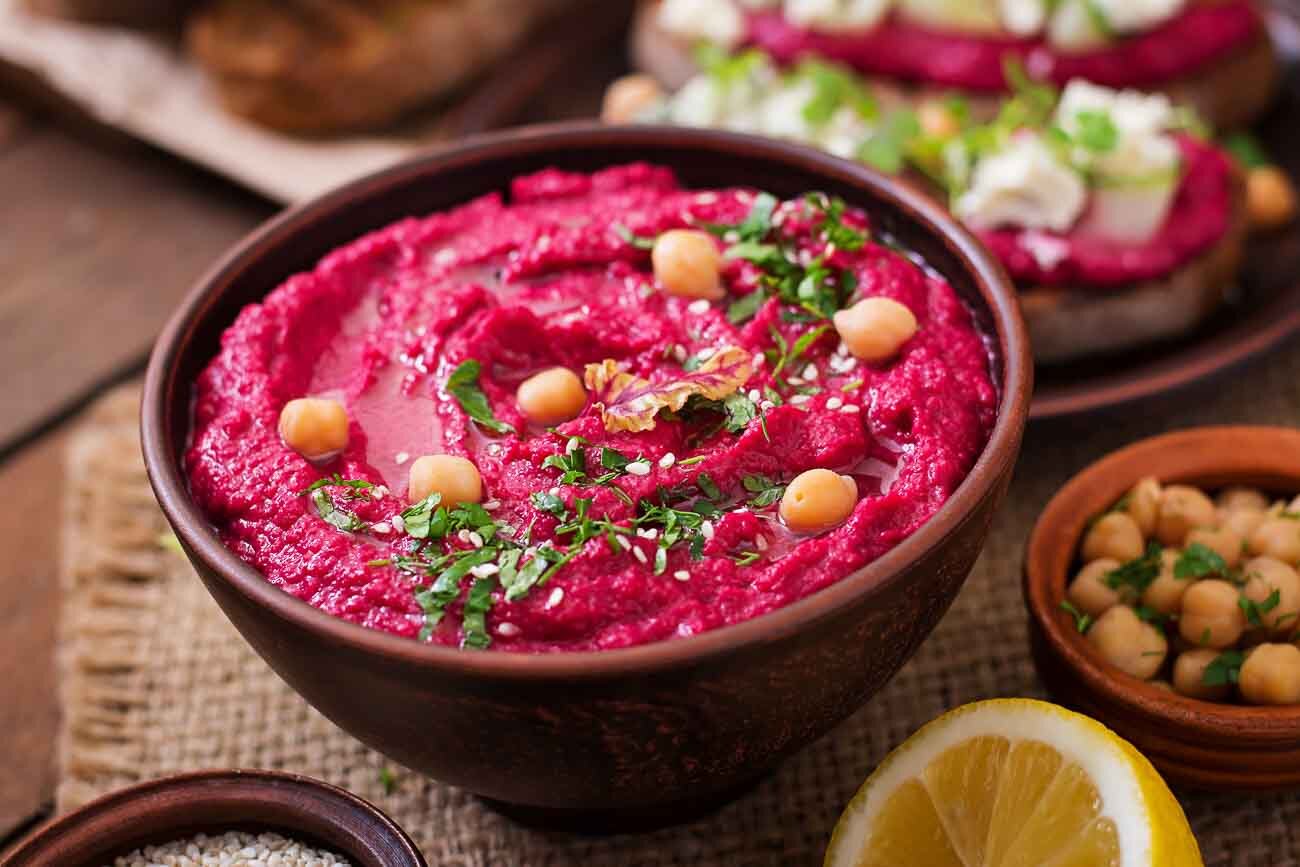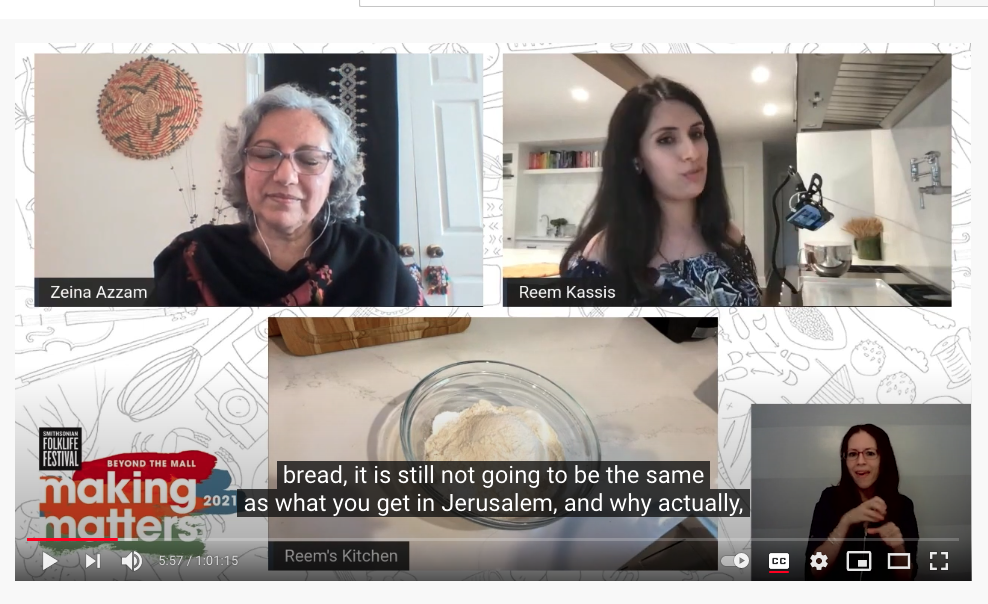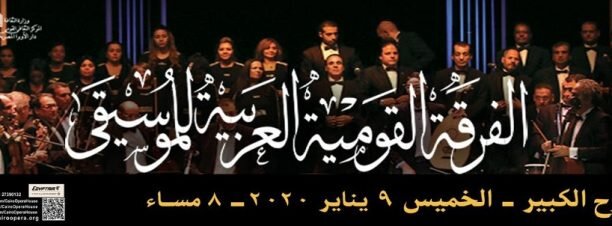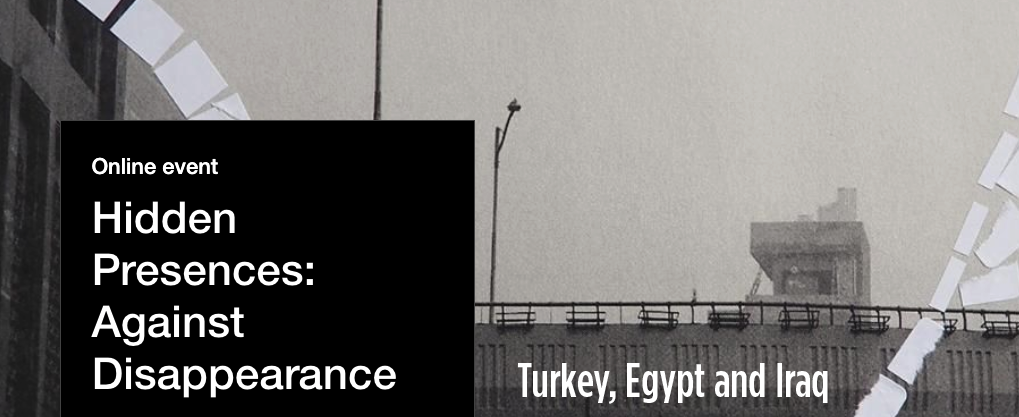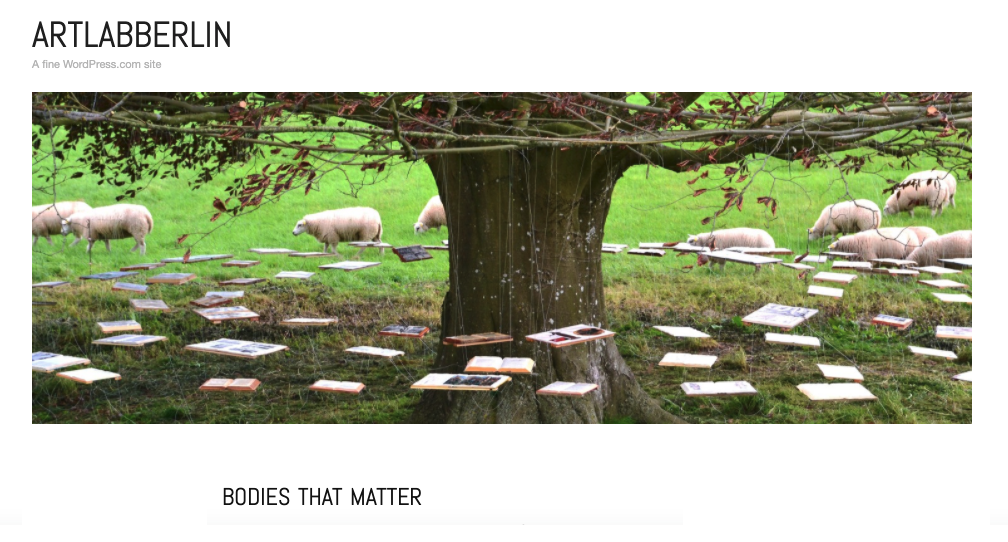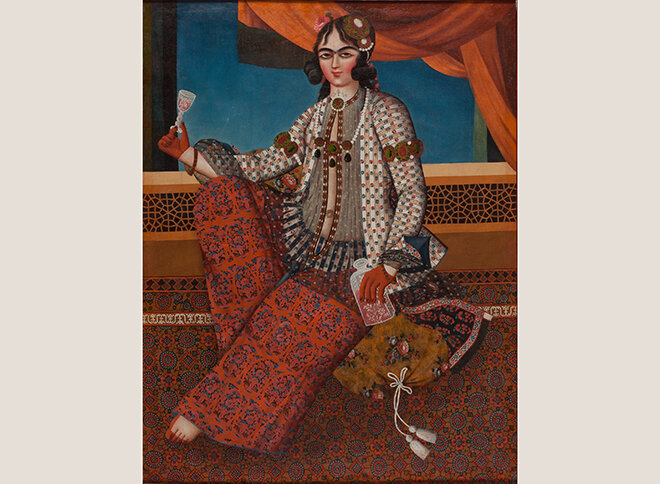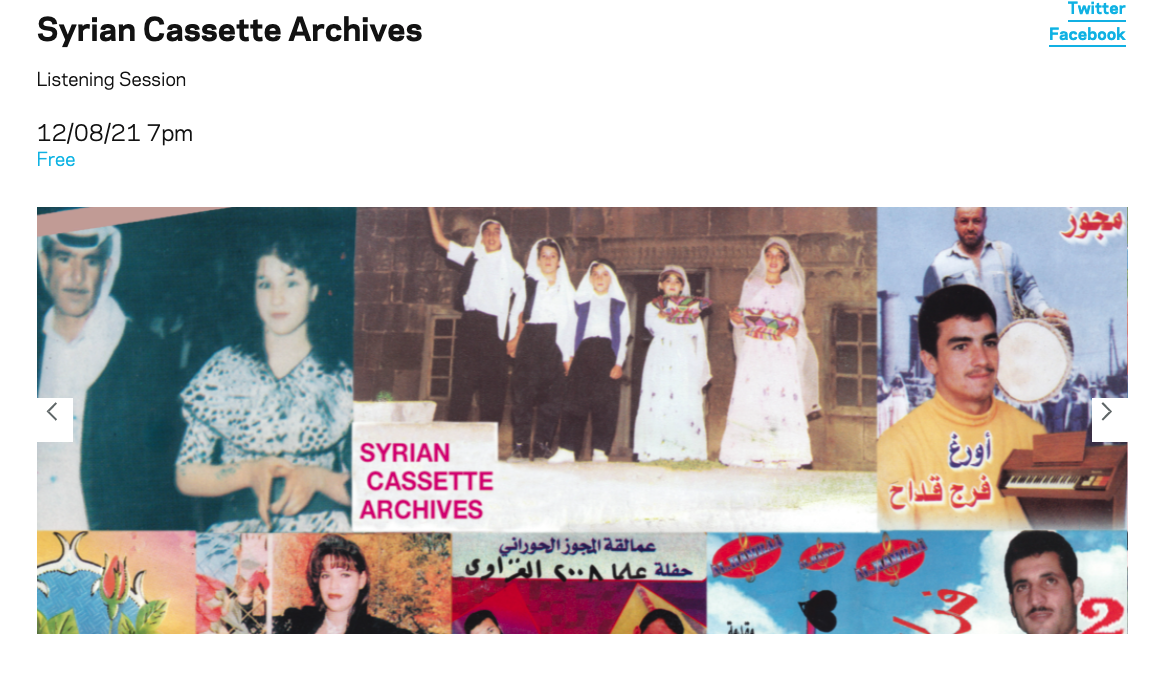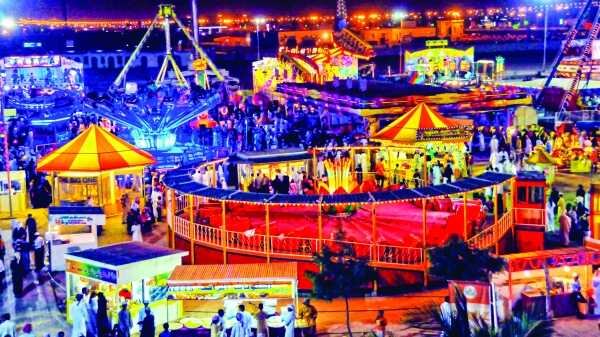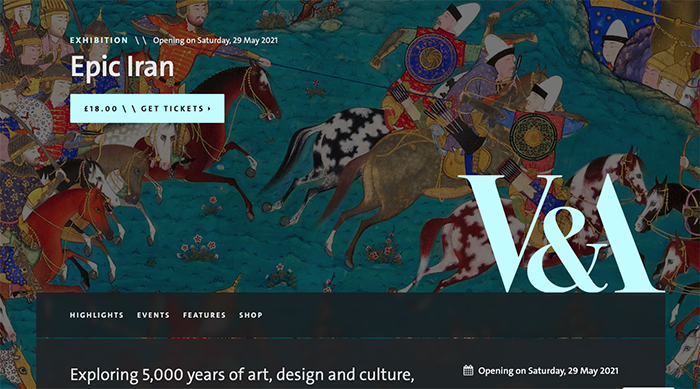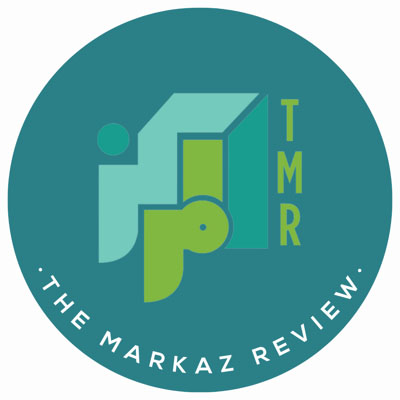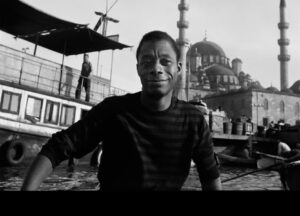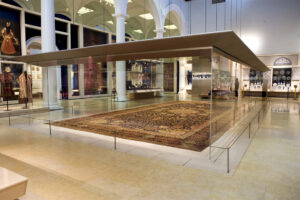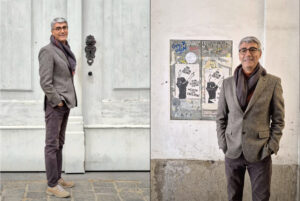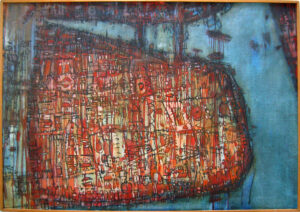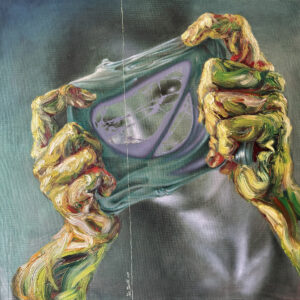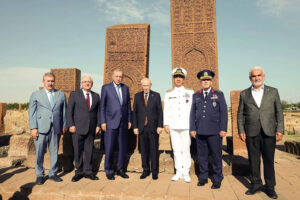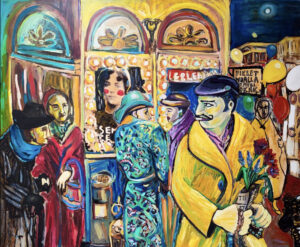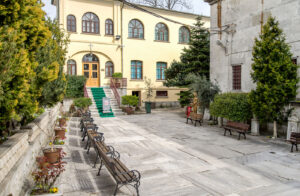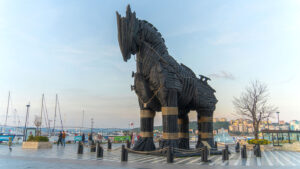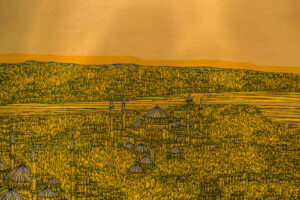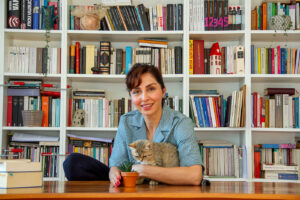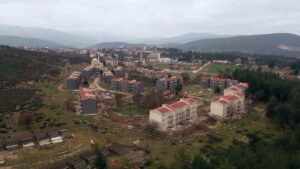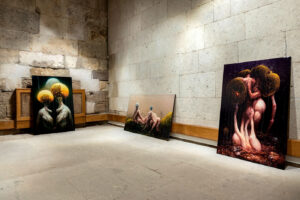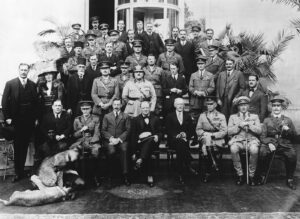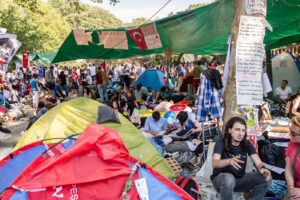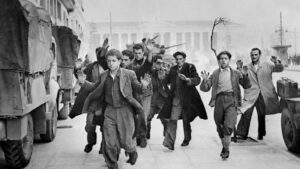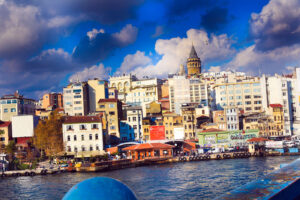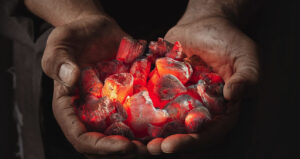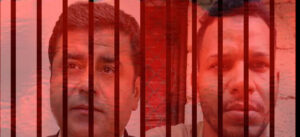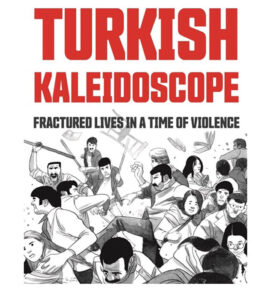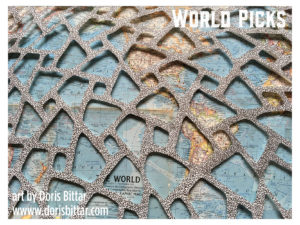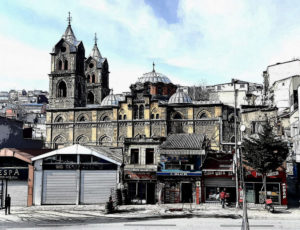“Al Fiddaiyoun” (Freedom Fighters), 1969, Naim Ismail (Syria, 1930-1979).
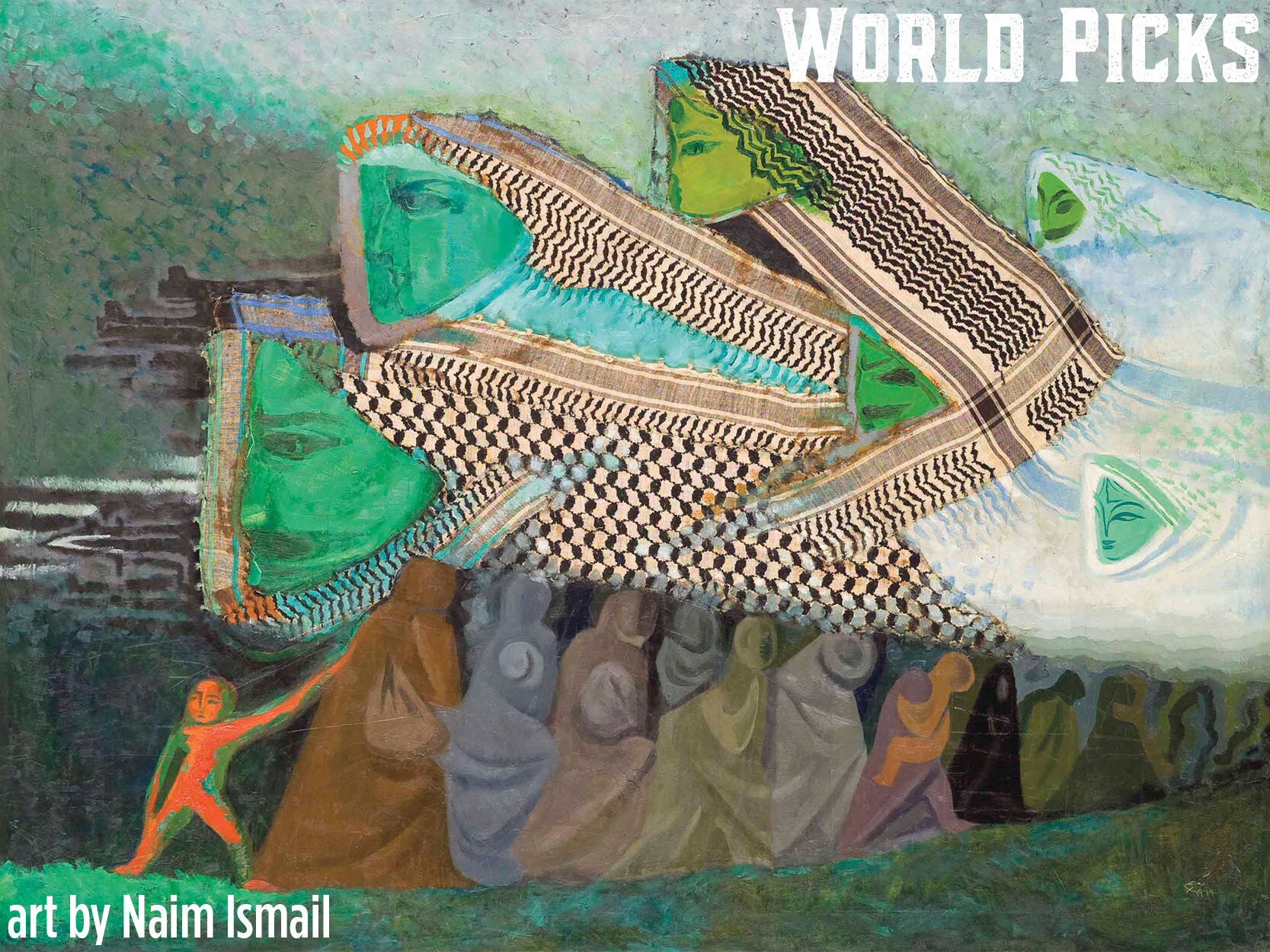
Got an event, book, film, conference or anything else you’d like to recommend? Drop us a line. —Editors Malu Halasa, Yara Chaalan
All listings are online, unless otherwise noted.
Listen anytime Beetroot hummus and culinary appropriation – Instant Coffee season 2 sneak peak
Free podcast from the LSE Middle East Centre
Instant Coffee, Season 2 goes beyond the plate to understand how the complexities of food, farming and cuisine in the region shape people’s writing, thinking, cooking and organizing. The podcast speaks with inspiring culinary Middle East practitioners grappling with culinary appropriation, access to food and food sovereignty, and reconnect with food in the diaspora, as well as archiving and translating the region’s recipes. As Palestinian Chef Fadi Kattan told Instant Coffee, in their sneak peak: “The day you stop hearing about Palestinian food, Palestinian music and Palestinian art and Palestinian literature is the day we would have given up.” A previous episode features legendary Egyptian-Jewish food writer Claudia Roden and the noted academic Sami Zubaida, editor of the pioneering food anthology: A Taste of Thyme: Culinary Cultures of the Middle East.
Still Hungry? Watch this: Languages of Home and Diaspora: Nourishing Palestine in Food and Verse
With Zeina Azzam and Reem Kassis
Smithsonian Folklife Festival: Beyond the Wall: Making Matters 2021
A conversation between friends and across the generations, cookbook author Reem Kassis and the poet Zeina Azzam converse about their lives as Palestinian mothers, daughters and writers. Kassis, who wrote The Palestinian Table (2017) and The Arabesque Table (2021), shows the making of ka’ak al-Quds, the Palestinian bread ring from Jerusalem. Azzam reads poems on cultural transmission and the art of resilience. Her chapbook Bayna Bayna, In-Between was published in May of this year.
The event was sponsored by Smithsonian Folklife Festival with the Roadwork Center, a cultural organization and “incubator for cultural initiatives aimed at advancing social justice.” Go here for the video.
Online Panel Discussion: Re-Seeding Culture: Syrian Artists in Berlin
With Khaled Barakeh, Kinan Hmeidan and Diana el-Jeiroudi, moderated by Malu Halasa
Hosted by the Arts & Culture Center, Middle East Institute, Washington D.C., in collaboration with the Goethe-Institut Washington
Berlin has emerged as the new hub for Syrian artists in the diaspora. Artist and founder of coculture Khaled Barakeh, the actor Kinan Hmeidan performing at the Maxim Gorki Theatre and independent filmmaker, producer and co-founder of DOC BOX Diana El Jeiroudi give visual presentations. They discuss the making of art, theatre and documentary film, in Berlin — the opportunities and challenges — with Malu Halasa, coeditor of Syria Speaks: Art and Culture from the Frontline.
10 July — Wahabiat, National Arab Music Ensemble Performs at the Cairo Opera House in Zamalek
The National Arab Music Ensemble was founded with the goal of reviving the classical Arab music heritage. The National Cultural Centre “Cairo Opera House” established the ensemble in 1989 and put it under the supervision of Dr. Ratiba El-Hefny and the directorship of Maestro Selim Sahab.
The main objective of the National Arab Music Ensemble is to collect the musical heritage from different Arab nations and present it in an academic context.
Soloists from different Arab countries performed with the ensemble. Among them were famous Arab singers like Wadee El Safy, Soad Mohamed, Soad Mekkawy, Somaya Kaysar and Lotfy Boshnak. The ensemble consists of about 100 musicians and singers. Due to its exceptional style, the National Arab Music Ensemble earned national and international acclaim. In its first year, the ensemble was awarded the Gold Medal and its conductor the Silver Medal at the Babylon Music Festival.
The Ensemble has participated in many festivals and celebrations such as the Carthage Festival (Tunisia 1990), the Kuwaiti National Independence Day (1991), El Rabat Festival (1993), Sour Festival (Lebanon 1997), El Kareen Festival (Kuwait 1997), Shopping Festival (Dubai 1998), El Mahaba Festival (Syria 1998), the Egyptian-American Friendship Association Concert (USA 1998), the Egyptian-Tunisian Cultural Week (Tunisia 2001), Umm Kulthum’s Centennial Celebration (Paris 2001) and El Rabat Festival ( Morocco 2001). More info/reservations.
July 13 — Hidden Presences: Against Disappearance—exploring examples of hidden heritage from Turkey, Egypt and Iraq.
Journalist and commentator Jo Glanville leads a panel to explore examples of hidden heritage from Turkey, Egypt and Iraq.
Discover hidden stories from city neighborhoods, nightlife and cabaret cultures and how we re-tell uncomfortable aspects of history in archival displays. This event is the third in the Against Disappearance discussions series by Shubbak Festival (opens in new window), a UK festival of contemporary Arab culture running 20 June – 17 July.
On the panel, visual artist Hera Büyüktaşcıyan talks about her collages currently displayed in the British Museum’s exhibition Reflections: contemporary Art of the Middle East and North Africa. They are based on research into ethnically and religiously diverse neighbourhoods in Turkey and India.
Choreographer and director Adham Hafez will discuss his re-imagining of the lively Cairo club scene at the turn of the 20th century in HaRaKa Platform‘s performance Cairo KitKat Club.
We’ll also learn more of the rich history of the port city of Basra in Iraq, which has often been turbulent and sometimes glamorous, but has been hidden from the world and from its own citizens behind war and devastation in recent decades. A project to renew the city’s main museum, located in a repurposed palace which had been built for Saddam Hussain, aims to recover that history and connect with popular memory and civic pride.
This event is presented by the Cultural Protection Fund (opens in new window), Shubbak Festival and the British Museum. The Cultural Protection Fund is led by the British Council in partnership with the Department for Digital, Culture, Media and Sport.
The talk will take place in English with BSL interpretation. A subtitled recording will be available after the event.
RSVP here.
Through July 18 — Exhibition: Bodies That Matter, Artists Hela Ammar, Marwa Arsanios, Tagreed Darghouth
Artlabberlin, at Iphonedoctor shop, Perleberger Strasse 60, D-10559 Berlin, Germany
Friday – Sunday 4 pm – 7 pm
Bodies That Matter presents the works of three artists who deal with the question of the role of the body and gender in the context of social and political conflicts. In her series Body Talks (2018), Hela Ammar shows portraits of Tunisian political activists. While the portraits are anonymized through the use of brightly colored scarves, nothing is lost of their self-confident bearing. In her video work, Who’s Afraid of Ideology (2019), Marwa Arsanios pursues self-organized projects by women who experiment with alternative forms of social organization. In her series Floral Dummies (2020) and Venuses and Aphrodites (2020), Tagreed Darghouth explores the question of ideals of beauty through the ages in the classical art medium of painting. Bodies That Matter is the fourth and last exhibition of Artlabberlin’s long-term project Where Have All the Jasmines Gone.
Artlabberlin is an independent and experimental art project space. On a regular basis it invites artists and curators working in different disciplines and aims to function as a platform for collaboration and exchange.
Through July 31st — Soundtrack to Puzzled Identities, P21 Gallery, Online exhibition
Soundtrack to Puzzled Identities explores entangled, sometimes clashing cultural affinities of diaspora Arabs, through a series of music-themed, pop art-derived digital illustrations, accompanied by musical mashups. From Umm Kulthum to Mashrou’ Leila, the digital artist Zineb Belrhiti-Alaoui juxtaposes famous Arab artists with well-known Western album covers, merging the past and present into conceptually layered illustrations that transcend cultural boundaries and play at the intersection of tradition and modernity. The exhibition aims to trigger nostalgia among those familiar with Arab music, while giving those who are unfamiliar a sense of curiosity about iconic figures, who shaped a popular culture. Curated by Mishelle Brito for P21 Gallery’s Re-Act series, Soundtrack to Puzzled Identities celebrates the ambiguity and diversity of “Arabness” in the modern world.
Through 25 July — Splendour of the Sunset: Iran of the Qajar Era, State Museum of Oriental Art, Moscow, Russia
For 136 years the Qajar dynasty ruled Persia as the nation struggled to modernise and unify. At the same time the rulers desperately fended off two predatory empires, the British and Russian, until in 1925 they fell to a new dynasty, the Pahlavis. Yet they left behind a remarkable trove of art that fused a rediscovery of pride in Iranian identity with a desire to emulate the best of the West.
Notable examples of this cultural flowering are now on display in Splendour of the Sunset: Iran of the Qajar Era. The exhibition is hosted until 25 July by the State Museum of Oriental Art in Moscow, and features some 300 paintings, ceramics, weapons, carpets, glassware and manuscripts, historical documents and photographs. Most have never been seen in public before. Each room is devoted to another aspect of late 18th to early 20th century Iran: war and hunting, politics, fine art, religion, and daily life. The art itself ranges from naïve popular artefacts to precious and beautifully crafted objects imbued with mythological references.
Besides its changing exhibitions, the State Museum has permanent galleries for Chinese, Japanese, Korean, Vietnamese, Caucasian, Indian, Buddhist and other Iranian art. The newly established Soviet Union founded the museum in 1918 as the first Russian effort to properly acknowledge the former empire’s Central Asian nations. So if you can prise your eyes from the pictures on the wall, the building itself, a gracious 19th century edifice, offers aesthetic pleasures of its own.
August 12, 7 pm — Syrian Cassette Archives – Listening Session Mosaic Rooms – Free
Artist, producer and audio-visual archivist Mark Gergis presents musical gems from Syria’s cassette era, from the 1980s to 2011. This Listening Session will highlight the musical styles from dabke and shaabi folk-pop, created by Syria’s myriad ethnic and religious groups, to popular song during the Cold War period. Many of these ephemeral tapes were not digitized, and have had a largely undocumented history before the country’s 2011 uprising.
After music from the cassette archives will be an hour-long set, featuring seven-inch vinyls from all over Syria, collected by Yamen Mekdad, a sound enthusiast and contributor to radio stations Root, Balami and Radio Al Hara, among others.
15 July – 31 August — Salalah Tourism Festival, Oman
The Salalah Tourism Festival occurs during the “Khareef” or monsoon season of Oman. It typically starts around mid-July and lasts until late August. During the Khareef season, the city of Salalah is transformed into a lush oasis, due to the rain showers that cool the summer air. The festival hosts beautiful artistic as well as cultural shows, with a mix of international programs for international tourists who come to enjoy the festival.
It is a vibrant festival; with clothes stalls, restaurants, music, games, theatrics, circuses and much more. Many families come to have a picnic and enjoy the beautiful monsoon weather, while others come to enjoy the shows, games and fireworks that take place. It gets bigger and grander each year, with more roller coasters, music, cultural activities, food stalls and so on. More info.
Through 26 September — Divas: D’Oum Kalthoum à Dalida at the Institut du Monde Arab, Paris
Showcasing an eclectic selection of music arranged in sequences of unforeseen sonic analogies, this collective mix was put together by Basma, who is of Nubian Sudanese descent and is based in London. She hosts the Khartoum Arrivals show on NTS Radio where she likes to tap into memories tied to old Sudanese love songs.
Listen to MARSM mixtapes for free on SoundCloud.
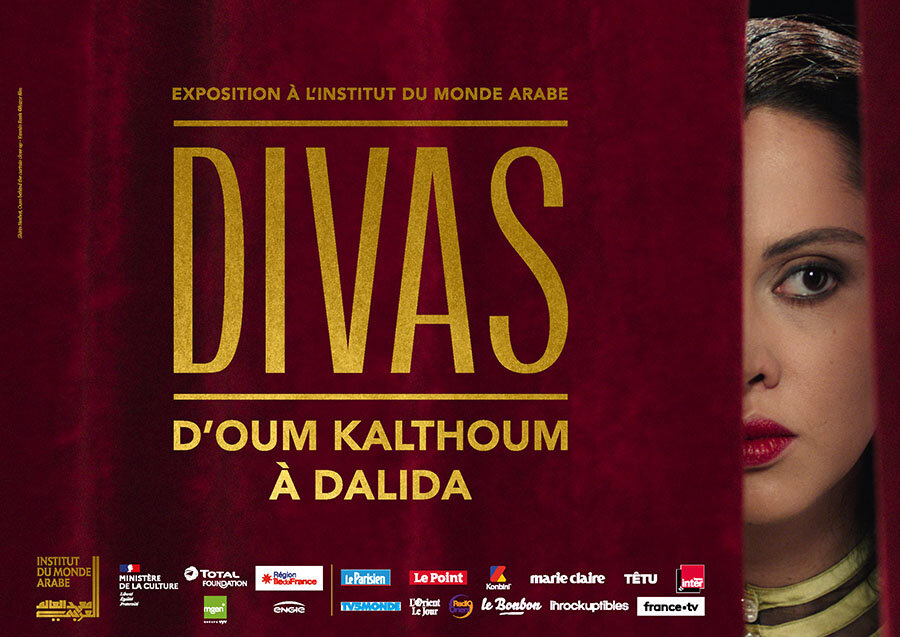
For decades, her voice sang the soundtrack to millions of lives across the Middle East. Now the Institut du Monde Arabe celebrates the stage and silver screen heritage of Umm Kulthum and other Arab chanteuses with an exhibition appropriately called Divas: D’Oum Kalthoum à Dalida.
Opening on 19 May and lasting till 26 September, Divas already features several tempting amuses bouches in the form of short videos on YouTube, with such alluring titles (in English translation) as Militant Divas and Pioneers of Arab Feminism. The website also comes replete with evocative film posters, going back to 1927 with Behidja Hafez in Laila bint al-sahara [Laila, la fille du desert].
These divas were no shrinking violets or hapless sex objects: Hafez, for instance, was Laila’s central character, director and co-producer. Tahiyya Carioca, the occasionally risqué artiste of 1930s films, was also, we learn, an ardent communist, who spent three months in prison after Gamel Abdul Nasser took power. Dalida, a former Miss Egypt in her leopard-skin bikinis, later highlighted social inequities in her many films; while Hoda Chaaraoui founded a salon in 1908 that championed free thought and female emancipation.
For her part, Samia Gamal created a new dance form blended from Arab, classical Western and Latin American styles, and appeared in a bewildering 50 films during the 1940s and 1950s. Asmahan, daughter of a Druze princess, not only possessed an unparalleled voice but also risked her life spying for the Allies in World War II. Warda began singing cabaret in Paris, but soon was moving millions with paeons to the Algerian revolution and donated concert takings to the anti-colonialist FLN militia.
Equally defiant of conservative norms, Layla Mourad – born Lillian Zaki Mourad Mordechai to a Jewish family – debuted at 15 in the 1932 film, Al-Dahaaya (The Victims). She charmed a generation of cinema-goers with her singing and comedic acting, and even ousted Umm Kulthum as “voice of the revolution” in 1953… until jealous rivals called her an Israeli spy.
While top Egyptian military figures quashed the rumors, she never reached the heights of the contralto, Umm Kulthum. The “Voice of Egypt” transformed the soundscape of popular Arab music with performances that often lasted for more than an hour per song. In 1975 her funeral brought some four million mourners onto the streets of Cairo. Unwilling to let her go, Egyptians to this day throng to concerts where she “appears” in hologram form.
Divas will charm viewers with its evocation of a golden age in modern Arabic culture. But there is more to the exhibition than nostalgic indulgence. Rather, it reminds one that even a century ago, powerful Arab women offered a sense of individualism, and a vision of hope, to a troubled region.
Until September 12, 2021 — Exhibition EPIC IRAN Epic Iran at the Victoria & Albert Museum
The Epic Iran exhibition explores 5,000 years of Persian art, design and culture though sculpture, ceramics and carpets, textiles, photography and film. The historic objects and artworks reflect the Iran’s vibrant historic culture, architectural splendors, the abundance of myth, poetry and tradition, and the evolving, self-renewing art and culture of today. From the Cyrus Cylinder and intricate illuminated manuscripts of the Shahnameh to ten-meter-long paintings of Isfahan tile work, Shirin Neshat’s two-screen video installation Turbulent, and Shirin Aliabadi’s striking photograph of a young woman chewing bubblegum, the exhibition presents an overarching narrative of Iran from 3000 bc.
It covers: the Land of Iran; Emerging Iran starting in 3200 bc when writing first occurred; The Persian Empire and the Achaemenid period; Last of the Ancient Empires and Alexander the Great; the Book of Kings, on the Shahnameh; Change of Faith, after the Arab conquest in the mid-seventh century ad; Literary Excellence on poetry, patronage and art; The Old and the New of the Qajar dynasty; and, finally, Modern and Contemporary Iran, which charts mid-century modernisms to the present day, with Farhad Moshiri and Shadi Ghadirian, among other artists.
Epic Iran was organized by the V&A with the Iran Heritage Foundation, in association with the Sarikhani Collection.




